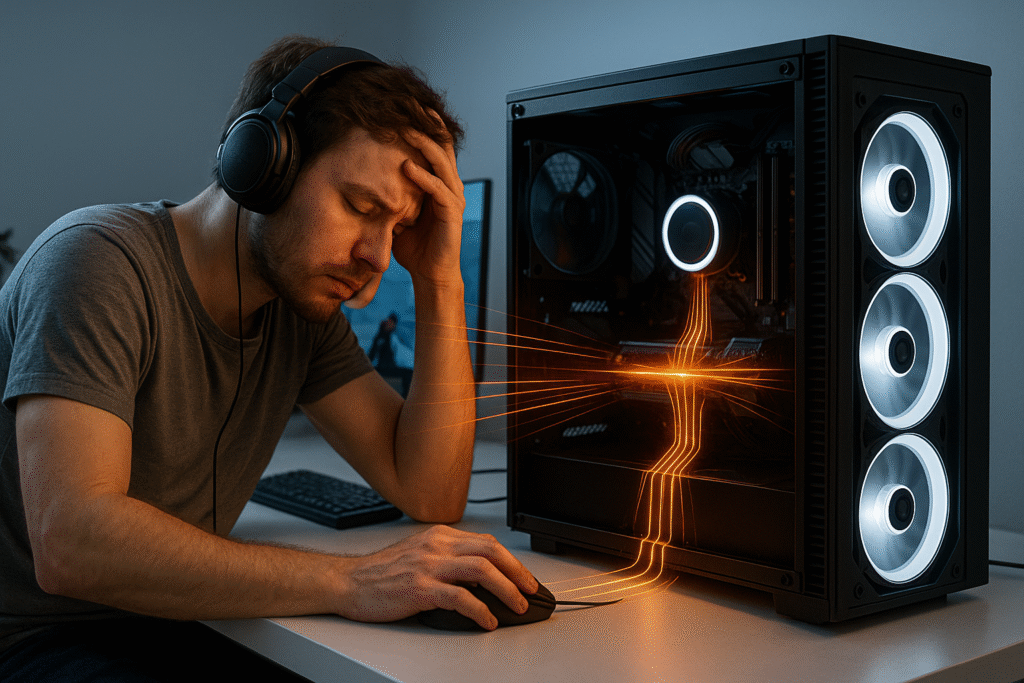Your Gaming PC Feels Slow It’s the Bottleneck
You’re Not Imagining It — Your Rig Might Be Holding You Back
You spent good money on your rig: top-tier graphics card, fast SSD, and plenty of RAM. But still, your favorite games stutter. Your FPS is all over the place. Even basic video exports take forever.
What’s going on?
Chances are, your system is suffering from a bottleneck — and it’s silently eating away at your performance, frame by frame. This guide will show you why bottlenecks matter in both gaming and productivity, and how to fix them without wasting more money.
H2 What Is a Bottleneck in Simple Terms?
A bottleneck happens when one component in your PC is significantly slower than the others, limiting your system’s full potential. Most often, it’s your CPU or GPU, but RAM and storage can be culprits too.
Think of it like this: you’re trying to race, but your car has one flat tire. No matter how good everything else is, that one problem slows the whole machine.
Gaming: Where Bottlenecks Hit Hard
Gaming demands speed, power, and smooth performance — and bottlenecks get in the way. If one part of your PC can’t keep up, you’ll feel it through lag, low FPS, or sudden freezes. That’s why every gamer hates bottlenecks — they ruin the fun right when it matters most.
You’re Not Getting the FPS You Paid For
Let’s say you pair an RTX 4070 with an old i5 processor. Your GPU is ready to fly, but your CPU keeps tripping over itself. The result? FPS drops, GPU underutilization, and disappointing performance in titles like Warzone, Cyberpunk, or Valorant.
Stutter, Lag, and Frame Time Spikes
Smooth gameplay isn’t just about high FPS. It’s about delivering frames consistently. Bottlenecks cause uneven frame pacing — the enemy of competitive gamers.
Game Logic Delays
Your CPU handles AI, physics, and in-game events. A bottlenecked CPU means slower reactions, delayed loads, and sometimes even crashes.
You Wasted Money
If your CPU can’t keep up, your GPU never hits 100%. That’s real power — and money — going unused.
Productivity: The Quiet Bottlenecks You Don’t Notice — Until It’s Too Late
You start the day with focus, plans, and energy—but somehow, it all slips away. The tasks drag. Progress stalls. It’s not burnout or distraction. It’s the hidden bottlenecks—small, silent inefficiencies that quietly steal your time until it’s too late to fix them.
Slow Rendering & Exporting
Whether it’s Premiere Pro or Blender, creative tools rely on both CPU and GPU. If they’re not balanced, your timeline gets laggy and your renders crawl.
Multitasking Struggles
Zoom, Chrome, Figma, and IDEs all at once? A bottlenecked CPU or insufficient RAM turns your workflow into a loading screen.
Wasted High-End Tools
Many apps support hardware acceleration. But if your bottlenecked CPU can’t feed data fast enough, your GPU’s advanced features go unused.
How to Check If You’re Bottlenecked
| Bottleneck Calculator | Analyze your CPU-GPU balance |
| MSI Afterburner + RivaTuner | Live monitoring during tasks/games |
Task Manager |
Spot CPU/RAM overuse |
| Cinebench / 3DMark | Benchmark to detect weak points |
Quick Fixes for Common Bottlenecks
| Problem | solution |
| CPU Bottleneck | Close background tasks, upgrade CPU, enable XMP |
| GPU Bottleneck | Lower resolution/settings, upgrade GPU |
| RAM Bottleneck | Add more RAM (16GB+), go dual-channel |
| Storage Bottleneck | Use SSDs, avoid old HDDs |
| General Lag | Update drivers, clean install Windows, disable overlays |
| Resolution Bottleneck | Match game resolution to your monitor’s native resolution. |
Pro Tip: Not Every Bottleneck is Bad
A little bottlenecking is normal. You can never reach perfect 100% balance. The key is to keep it small enough that it doesn’t affect performance noticeably — ideally under 10–15%.
Final Takeaway
Bottlenecks matter more than most people think. They can turn an expensive setup into an underperforming headache.
Check your system using a Bottleneck Calculator, balance your build, and don’t throw money at upgrades without knowing what’s really slowing you down.
What is the biggest cause of bottlenecks in gaming?
The CPU is often the most common bottleneck, especially when it's not powerful enough to keep up with a high-end GPU.
Can bottlenecks damage my PC?
No. Bottlenecks won’t physically damage components, but they limit performance and efficiency.
How do I know if my PC has a bottleneck?
Use tools like Task Manager, MSI Afterburner, or a Bottleneck Calculator to check if one component is maxed out while others are idle.
Is it better to have a GPU or CPU bottleneck?
Generally, a slight GPU bottleneck is better. It means your CPU isn’t holding back your graphics card.
Can I fix bottlenecks without upgrading parts?
Yes. You can optimize settings, close background apps, overclock (carefully), and adjust resolution or game settings.
